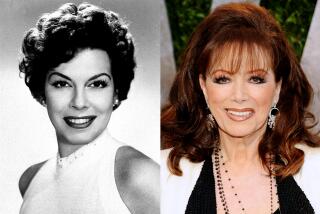The Brassy Dames of the Classic Pulps
Hard-Boiled Dames: A Brass-Knuckled Anthology of the Toughest Women From the Classic Pulps, edited by Bernard Drew; preface by Marcia Muller (St. Martin’s: $16.95)
I’m not sure what it means exactly, but I’m afraid I’m going to have to plead guilty to charges of Immaturity in the First Degree for loving this book so much. “Hard-Boiled Dames” spirits the reader away to the world of the pulps--where, for instance, Vivian Legrand, “The Lady From Hell” (who actually works out of Shanghai), pits herself against “Colonel Sir Mark Caywood, chief of the British Secret Service in the Far East” and “Mandarin Hoang Fi Tu, underworld leader of Manila.” She makes both of those boys look like saps. . . .
We’re talking about a world where--with the exception of two or three overweight, schoolmarmish private investigators who say ain’t and pack a wallop like the Refrigerator himself--every girl is slim, young, independent and drinks gin like it’s root-beer floats.
True, some of these lasses are merely sidekicks and don’t get to do too much in the way of crushing crime. Frankly, I don’t get what Sue McEwan sees in her fiance, a moronic hero named Moonman, but that’s Sue’s business, you know? We’re talking the world of the pulps, and it’s sad, really sad, that half the people reading this have never seen one. Pulp magazines flourished in the ‘30s and ‘40s. President Roosevelt subscribed to Black Mask on the sneak. Pulps had lurid covers, fast-paced stories and, strangely, not very much violence. There’s one slashed throat in these pages, but mostly just a few gunshots, and mainly men rendering villains unconscious by uppercuts to the jaw.
The women here (scarce in the pulp world) are glamorous, but not sexy. Only one indulges even in heavy petting--that would be the Domino Lady, who equals Moonman when it comes to silly costumes and is, it seems to me, of very dubious character. But take a girl like Trixie Meehan, whose creator, T. T. Flynn, followed the American writing tradition of those days by “hitting the grit, or hoboing, if one must be literary; shipyard, steel mills, house-to-house selling, traveling salesman; carpenter, clerk, followed the sea on deck and the engine and fire room; worked in a railroad shop and as a locomotive inspector. . . . I believe a fiction writer deals with life as a whole and he or she should know it from all angles.”
Unconstrained by He or She
Do you see what I’m saying here? There used to be a time in America when you didn’t have to have a college degree to write stories! When T. T. Flynn didn’t have to be harangued by Gloria Steinem to remember to say “he or she” when talking about writers; T. T. was gallant and straight-shooting enough to do it voluntarily! Then he was classy enough to make his Trixie stand up to her partner, Mike, to kid him when he was pompous, and pull him out of tight spots like a real buddy.
These were times when heroes and villains spent most of their hours creeping across dark lawns and climbing through windows to get at each other. When gambling was serious business and the country reveled in hard liquor. When the best thing (it seems from these pages) that men and women could have together was not sex or even love, but fun. And for readers in a certain age bracket, some of these stories may raise the hair on their forearms: In “Double Trouble” (in which “Daffy Dill, Whirlwind Reporter for the New York Chronicle, Risks his Precious Neck in Order to Follow Dinah’s Brainstorm Hunch!”), Daffy, his spunky girlfriend, Dinah Mason, who “went to Alabam U. and got a burning ambition to do a George Jean Nathan,” and a friend of theirs, Lieutenant Bill Hanley, hang around the scene of a crime. . . .
Out of the Mouths of ‘Babes’
They chat, they chum about, they say things like “Thankee, my fran”; they call the criminal a “nassy man.” Suddenly it comes back that those words and phrases were the chic talk of journalists (maybe everybody?) in the ‘30s; that those phrases came out of our parents’ (or grandparents’) mouths when they were young. Suddenly the past--when airplanes flew at a hundred miles an hour and nobody had even heard of Pearl Harbor, let alone the Atomic Bomb--that sweet past, comes back.
“Hard-Boiled Dames” is about friendly women and brave men, and dastardly villains like the Haitian sorcerer, Ik-La-Duk. A coarse world, maybe, but never boring.
I must write here that as my father lay dying he fretted about a Chinese gangster named Ching Chang Phooie, who he felt sure was lurking in the hospital bathroom, planning to kidnap him. My dad had written for the pulps, and he knew well enough that the best way to fight sadness was to dress it up in costume, give it a silly name and get Queen Sue, the Domino Lady and Trixie Meehan to chase it away.
More to Read
Sign up for our Book Club newsletter
Get the latest news, events and more from the Los Angeles Times Book Club, and help us get L.A. reading and talking.
You may occasionally receive promotional content from the Los Angeles Times.









